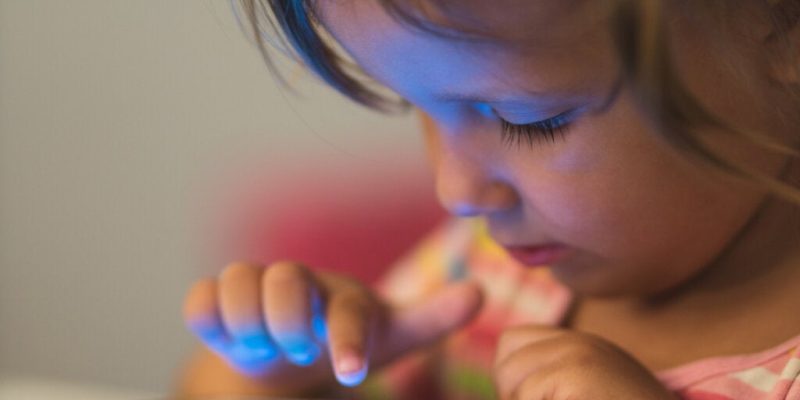Today’s children are true digital natives. We could say that they learn to use a cell phone before they learn to communicate, read, or ride a bicycle. While this may appear to be an advantage, in reality, it isn’t necessarily the case. Because, as science has been telling us for a long time, the excessive use of screens has a negative effect on our little ones.
Nowadays, we’re seeing increasing numbers of children with problems such as sleep disorders, eating disorders (ED), myopia, or even musculoskeletal problems. Furthermore, mood disorders, such as depression and anxiety, have been increasing in recent years in this sector of the population.
It’s becoming increasingly evident that there’s something, as parents and educators that we’re doing wrong. Because new technologies in themselves aren’t a danger. On the contrary, they’re allies in the formation of knowledge and learning and in staying connected. The challenge lies in the way in which we misuse them.
Educating children on the correct use of cell phones, tablets, and computers is also part of their psychosocial development. Moreover, in childhood and adolescence, we should begin to conceive of screens as ‘junk food’. In other words, something that they should consume only occasionally.
Children who make excessive use of screens take longer to develop aspects such as communication or fine motor skills.
Excessive use of screens: impact on development and mental health
There are many families who correctly educate their children on the use of new technology. They not only give guidelines to their children, but they also limit and advise them. In addition, they know how to set an example. However, in recent years, it’s been observed that some parents use their cell phones or tablets as resources to keep their children entertained.
In fact, they’re an easy mechanism with which to get children to be still and quiet for a few hours. Parents even allow them to use them while they’re eating. In fact, almost without realizing it, these parents are replacing communication and interaction with their children with cold and stimulating screens that start to shape their children’s brains from an early age.
Research conducted by the University of Calgary (Canada) warned that many children today arrive at preschool with various delays in their developmental milestones. They evidence a poorer vocabulary and demonstrate immaturity in motor skills such as fine motor skills (manipulating objects).
In addition to the developmental field, it’s also important to think about the psychological aspects of excessive screen usage.
Childhood depression, anxiety, and hyperactivity
Screens have a great power to stimulate a child’s brain. In addition to the impoverishment of language or attention problems, changes in mood are seen really early. Furthermore, a child who, at the age of two is already entertained with their father’s cell phone or tablet, will know of no other way to spend their free time when they’re five, seven, or even nine years old.
Seven-year-old children show mood disorders associated with new technologies by way of dependence on screens, sleep disorders, poor communication, and lack of connection with their peers. These are all triggers for depression.
They’re children who sleep poorly, who don’t possess good communication skills, and become addicted to cell phones, tablets, and computers. This phenomenon is further intensified in adolescence with the use of social media. That’s when young people begin to compare themselves and suffer issues of low self-esteem and body acceptance problems.
The use of screens from an early age limits the interpersonal contact of children with their peers. This restricts their abilities to communicate with other people. In addition, they become obsessed with the virtual universe to the point of conceiving the real world as a scenario lacking in stimuli and incentives.
Excessive use of screens and disconnection from the child’s social environment
The excessive use of screens alters the reality of the child. They’re in a situation where everything happens extremely fast and the colors are vibrant, stimulating, and entertaining. It’s a world in which they’re in control at all times, without even needing to move. They simply have to click, open tabs, and scroll.
In that universe, they can talk to people without even leaving home. They also have all the information in the world at their fingertips. Including the kind that they should never see as minors. In fact, research conducted by the University of New Hampshire (USA) claims that children often find themselves being sent pornographic images without even having searched for them.
This excessive use of digital devices added to the lack of parental supervision, doesn’t only hamper their cognitive and maturational development. In fact, we’re giving the world boys and girls who feel sadder than ever and who are disconnected from their social environments. In many cases, they feel the real world is too complex, chaotic, and even threatening in many cases. Not to mention boring.
It’s clear why mental health problems are increasing among the child and adolescent population.
Children between two and four years old mustn’t be exposed to screens for more than one hour a day.

How to regulate their use of electronic devices
Tablets and cell phones aren’t toys. They’re communication, work, and entertainment tools for adults. Unfortunately, it seems that few things today generate as much panic in parents as a bored and idle child. Almost instantly they’re offered their mother’s cell phone so that they can play some games.
We’ve forgotten that nothing is as necessary as a child getting bored and frustrated. Indeed, it’s then that their imagination and symbolic and creative thinking are activated. Also, their need to play with other children, move around, and develop their communication, mobility, and cognitive and emotional skills.
Hear are some other tips that may prove useful.
Exposure times and use of screens
- The World Health Organization recommends specific guidelines. Children between the ages of two and four shouldn’t have more than one hour of screen time per day. Before the age of two, they shouldn’t have any exposure.
- Electronic devices shouldn’t be used during meals. They should also be turned off two hours before going to bed.
- Between seven – twelve years old, they should only be exposed for one hour with an adult present.
- Between 12 – 15 years old, an hour and a half is suggested, with adult supervision if social media is being used.
- From 16-18, two hours a day is recommended, avoiding the use of cell phones at night.
It’s more than evident that these recommendations are rarely followed. Especially if we take into account that the average age at which a child has their first cell phone is eleven years old. However, we reiterate the problem isn’t the technology itself.
What we’re concerned about is its misuse. This is where our responsibility as adults comes in. Indeed, knowing how to educate and setting an example means we’re taking care of the future mental health of our children.
The post Excessive Use of Screens Can Cause Depression in Children appeared first on Exploring your mind.



















Comments